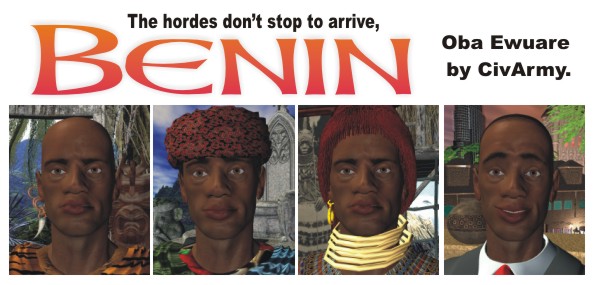Great stuff!
Here's a pedia entry, if you want one.
#RACE_BENIN
^
^Most of the great empires of West Africa, including Mali, Ghana and Songhai, developed in the open savannah region
between the river Niger and the forests of the south. The people of these forests, for the most part,
lived in city states with little power beyond their own walls.
The great exception to this rule was the empire of Benin.
^
^There seem to have been people living in relatively advanced conditions in southern Nigeria
long before the rise of the kingdom of Benin, if the ruins of the great walls around Benin City are anything to go by;
certainly these apparently predate the civilisation of Benin itself.
Benin regarded itself as deriving legitimacy from the city of Ife, to the northwest,
the chief city of the Yoruba people who also developed an important power base.
It seems likely that Benin grew in power, and started to eclipse Ife, in the twelfth or thirteenth centuries.
The rulers of Benin succeeded in uniting the peoples of the surrounding forests,
who until then had spent their time arguing and warring with each other,
and they built them into a powerful empire.
^
^The ruler of Benin was called the Oba, and tradition holds that the first Oba was Ewaka I,
the son of Oranmiyan, king of the Yoruba.
In the early years, the kingdom was ruled by a council of local chiefs, called the Uzama,
headed by the Oba. However, by the late thirteenth century, the Oba was becoming more powerful.
Just as the empires of Mali and Ghana, and also Kanem-Bornu, increasingly came to idolise their kings,
so too the Oba became more and more important to Benin, both politically and symbolically.
In a way, the Oba WAS the kingdom of Benin.
^
^This process reached its apogee with {Oba Ewuare the Great}, who ruled in the fifteenth century.
He introduced the principle of hereditary kingship, and also the law of primogeniture,
according to which his son would inherit everything. The power of the Uzama was correspondingly reduced.
Moreover, he increased the power of local government by creating new kinds of local chiefs -
but this also increased his own power, since he appointed them. These local chiefs had considerable power,
but from the Oba's point of view they were very valuable as they acted as tax collectors
and paid him tribute. He could also play them all off against each other if need be.
#DESC_RACE_BENIN
^While he was at it, Ewuare increased the power of Benin itself, partly by building great walls and fortifications
that turned Benin City into a mighty fortress, and partly by conquering greater areas.
This process was continued by his son, Ozulua the Conqueror,
until Benin controlled the whole of the southern part of what is now Nigeria,
including much of the Yoruba territory. Lagos, the modern capital of Nigeria until 1991,
was founded as a military garrison. This was the "golden age" of Benin,
and the period when it produced its most famous artworks, the celebrated bronze castings.
Copper and bronze working had been practised in the area for centuries,
but it was the expansion and development of the kingdom that created the social conditons -
and brought the raw materials - which allowed the art to be refined to its highest form.
In particular, trade with the Portuguese, who opened up the West African coast in the late fifteenth century,
helped to spur the process. Ewuara had already divided Benin City into two wards -
one for the palace and state administration, and one for the artists.
But it was under Oba Esigie, son of Ozulua, who ruled from 1504 to 1550, that Portuguese trade was developed
and the most famous bronze casts created. These were an extensive series of bas-reliefs,
made to adorn the Oba's palace. They depict the whole world of sixteenth-century Benin court life,
especially the military, and in their breadth and extent have been likened to the Bayeux Tapestry.
Yet the high culture of Benin rested upon blood cult and violence - for human sacrifice would continue to be
practised, seeing a resurgence even in the late nineteenth century.
^
^Benin continued to exist as a major power in the area and continued to trade with Europe -
although after the sixteenth century its main export was slaves. By the eighteenth and nineteenth centuries, though,
Benin was declining. The Yoruba states still existed to the west,
and long years of warfare with them ground down the power of Benin.
More importantly, the British established a colonial presence in the area in the nineteenth century.
They disrupted Benin's economy by abolishing the slave trade, and threatened to overwhelm it culturally.
The end came in 1897, when the British invaded, massacred many people, razed Benin City to the ground,
and stole all its treasures. Benin was incorporated into the British protectorate of Nigeria.
Today, the Republic of Benin bears the name of the old kingdom, but Benin City itself is in Nigeria,
and remains an important cultural force there. The Yoruba, who made up much of the population
of the old kingdom, are the largest tribe in Nigeria, and there is still an Oba,
who ceremonially rules from Benin City, though he has no official power.



